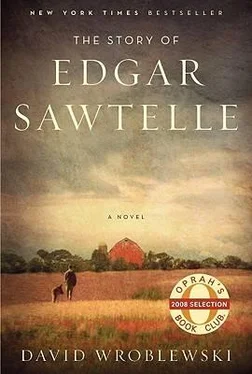Then he came to his senses. Somewhere he’d read that people who tried to eat after long stretches without food threw it up, though he felt in no danger of that himself, only a comforting sensation in his middle. Probably, that wisdom had been written by the same person who could survive for a month without food. They had lasted three days. But it would be foolish not to wait a few minutes, just to be sure. The dogs scoured the ground where the SpaghettiOs had so briefly lain while Edgar counted out one hundred breaths. The wieners were salty. They made him thirsty, but that was okay. That was just fine.
He picked up the remaining food and retreated to a clearing out of sight of the cabins. It was the friendliest-looking place he’d seen in days. He sat down Indian-style while the dogs gathered around him, transfixed, and like a magician performing sleight-of-hand, he began working the opener over a can of pork and beans.
Pirates
B Y THEN THEY’D BEEN GOING FOR TEN DAYS, MAYBE MORE-Edgar had started to lose track-and over that time they’d come to a new set of accommodations for how to be together. He had no tackle with him-no leads, no collars, no long lines, no ground rings-none of the means they’d had at the kennel to agree about what mattered: the ways to stop and start, when to stay close and when to explore, how to attend one another. He had few rewards to give, some days not even food, though that happened less often after the first week-after they learned to work the cabins. And so, by necessity, he began to watch the dogs more closely, stop more often, touch them more sweetly and more carefully than he ever had before.
And the dogs, in turn, discovered that if they waited after he’d asked them to stay and disappeared into a cabin, he would always return. Together they practiced new skills he devised. They had long understood what was being asked of them during a stay, whether in the training yard or in town; now he asked if they would stay in a forest glade when they were hungry and the flickers pounded the ground, thumping up millipedes, or squirrels harassed them, or a rock sailed over their heads and rattled the dead leaves. Several times each day he found a likely spot, shielded by sumac or bracken fern, and he placed them in guard over something small-a stick he’d been carrying that morning, say, or a bit of rag. Then he walked off into the forest, careful not to push them past the breaking point since he had no way to correct them. Later, he tied a length of fishing line to the guarded thing and asked them to move only when it moved, keeping it surrounded. When they got that right, he’d sail back into their midst signing, release! and throw himself at them to roll and tickle, toss the thing for them to catch, see to each of them in whatever way he’d learned was the greatest delight for that dog.
He learned, too, the limits of their patience, different for each of them. In a stay, Baboo was as immovable as the hills, and likely to fall asleep. Essay, ever alert, was the most tempted of any of them by the skitter of a rock pitched through the ferns. And Tinder, equally likely to stick or bolt, who twice jumped up when Essay broke her stay and licked her muzzle and coaxed her back into a sit.
They agreed, more slowly, that running away mattered as much as staying. After some time he could ask them to find a spot elsewhere and wait. At first they ventured only a few feet; later, they ran until he couldn’t see them any more. They agreed it was important not to bark when they needed his attention or when they got excited. They practiced these things many times each day, whenever they tired of breaking trail through the underbrush. He began to link the idea of running away and guarding; he put the thing to guard on the ground and walked the dogs away from it, then made them return, watch it, scoot along with it as it jerked through the dead leaves on its string. He spent long evening hours picking through their coats for ticks and burrs. He checked their feet a hundred times each day.
And he compromised his idea of their destiny in order to live. They could make only as much progress as food allowed. What point was there in bolting northward if they starved halfway to wherever he intended to go? They had to pick a route that kept them hidden and let them harvest food. That meant a pace slower and a route more circuitous than he’d imagined.
He became an expert burglar of vacation cottages and fishing shacks. Mornings, while the campers fried bacon and flipped pancakes, he and the dogs lingered in the weeds; later, those same cabins would stand empty, ripe for plundering. He learned to enter without breaking, and always left without taking enough to be noticed. He carried few supplies, and none that would tie him down. A can opener and a jackknife and, later, when their diet made his teeth and gums feel buzzy, a toothbrush. A child’s Zebco spin-casting rod, small enough to carry through the woods. A fisherman’s satchel with a bobber and some hooks set in a piece of cardboard. With a little skill, he provided for them all-panfish, mainly, but sometimes a bass or a bullhead, too. Plenty of nights they went to sleep hungry, but seldom starving. The cabins yielded Twinkies and Suzie-Q’s and Ho Hos by the armful, deviled ham and custard pies and corn chips and peanut butter to eat straight from the jar, handfuls of Wheaties and Cap’n Crunch washed down with soda, and an endless procession of wieners and salami and sardines and Hershey bars. Occasionally he even found dog food, which the dogs gobbled from his palm like the most uncommon delicacy.
And he stole Off!, that balm of peace and contentment, that ambrosia of the skin. Heavenly, wonderful, miraculous Off!-above all, the Deep Woods variety, whose bitter flavor and greasy viscosity came to signify something as essential as food or water: a day unmauled by deerflies, a night of refuge from mosquitoes. He stole it from every cabin he tiptoed through-all of it, remorselessly. Wherever they spent more than a day, he hoarded two or three of the white-and-orange aerosols, and a batch of Bactines as well.
Rainy days were hard. Sometimes there was no better shelter than the base of a thick jack pine, and if the wind blew, that could be no shelter at all. Rainy nights were torture: great, racking storms, with lightning exploding all around. If he looked into the strobed rain too long, he ended up curled and oblivious, for if there was no figure to be seen in the falling drops of water, he felt abandoned, and if he saw anything-a shape, a movement, a form-he screamed, silently, despite all resolution to the contrary.
Other dogs were a problem, idiot dogs that, having scented them, loped into the woods, disregarding the cries of their owners to come back, come home, come play…Some trundled along like clowns, others, looking for trouble, like snipers. Baboo, especially, took umbrage, and he led his littermates in savage charges, ignoring Edgar’s protests until the marauders ran howling away.
They drifted from lake to lake, like stepping stones across a creek, moving westward through the Chequamegon. Sometimes Edgar learned the names of the lakes from leaflets inside the cabins-Phoebus, Duck-head, Yellow-but usually it was just The Lake. Without maps, they found themselves hemmed in by marshes and forced to backtrack. The dogs had long since grown expert at finding turtle eggs; one or the other would suddenly track down and run along a tangent and start to dig. The eggs ripened and grew ever more disgusting, apparently in equal proportion to their delicacy. But Edgar helped with the digging and pocketed a few for later, as rewards. He tromped along the rushes at shorelines until frogs leapt toward the waiting dogs, who pounced and munched.
He stole matches whenever he spotted them. During the day he wouldn’t build fires, wary of smoke-watching rangers in towers, but at night he allowed himself small, yellow cook fires, kindling them with papery curls of birch bark. After he tamped them out with dirt, he and the dogs slept listening to the yips and moans of beavers. At daybreak, loons cried.
Читать дальше
Конец ознакомительного отрывка
Купить книгу












